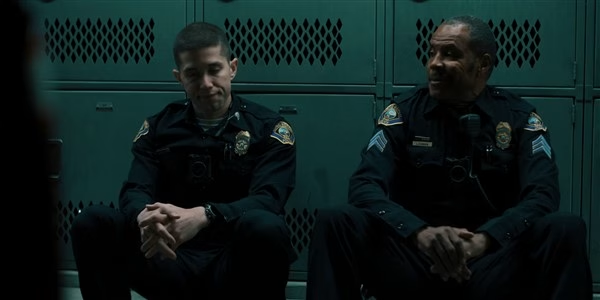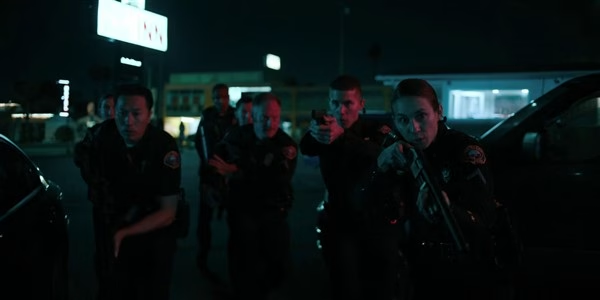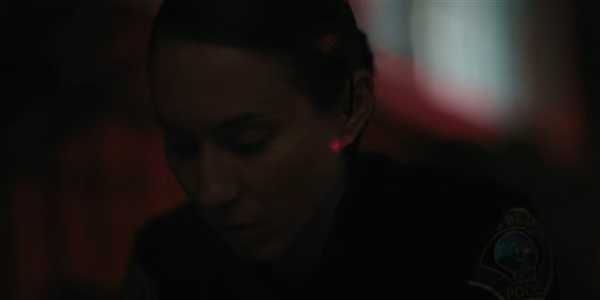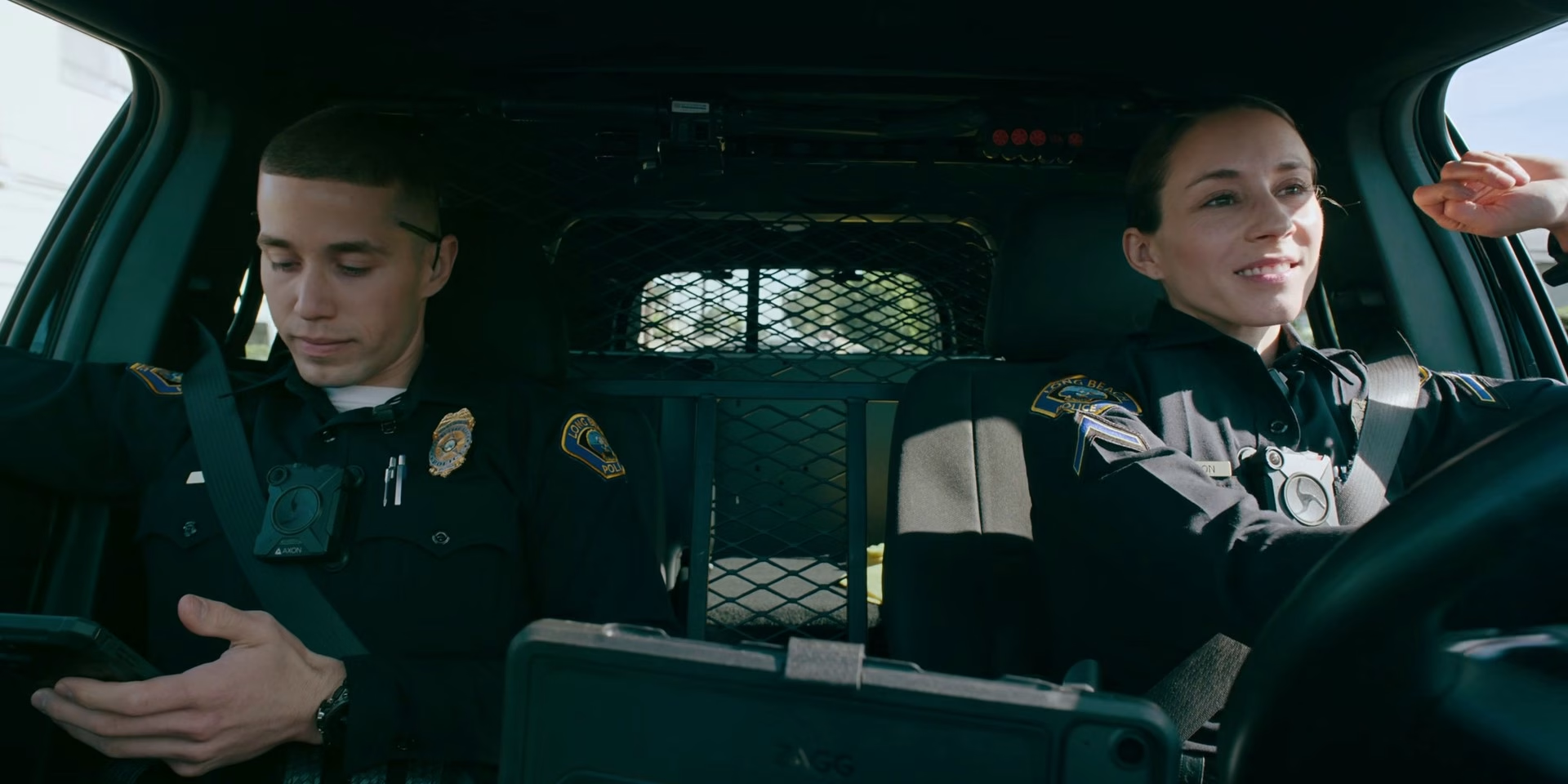On Call, Prime Video’s first swing at the ever-popular Dick Wolf-produced police procedural, is a series built of many familiar contemporary elements. Its visual design is a clutter of somber establishing shots and shaky bodycam footage, its narratives are designed around the unassailable heroics of its uniformed characters, and it is set in a world of clear good guys and bad guys – one where the work of cops are unflinchingly uninfluenced by the world they presumably exist in. And despite its attempts to separate itself from its predecessor (both in name and reputation; worth mentioning this series is co-created by Wolf’s son, Elliot), On Call is visibly handcuffed by these rules; though there are a handful of intriguing moments suggesting it might have ideas of its own throughout its eight episode first season, its resistance to change makes it a mostly watchable, quickly forgettable story with a decent style, and a distinct lack of voice.
Alongside Max’s The Pitt (which I enjoyed more than expected), On Call feels like the beginnings of a movement to reground the medical and police procedural dramas, with a renewed focus on “the work” and a few visual and creative tweaks to ensure audiences they’re watching a show set in the 21st century. Each half-hour episode (yes – a half hour police procedural! more on that later) focuses on a patrol shift between grizzled training officer Traci Harmon (Pretty Little Liars‘ Troian Bellisario) and her latest recruit, Alex Diaz (Brandon Larracuente, of the Party of Five remake we all forgot about), as they deal with the ever-prescient collection of drug addicts, hard criminals, and random acts of violence happening on the streets of Long Beach, California.

The first pair of episodes are incredibly straightforward; as we are introduced to tight-lipped Harmon and the wide-eyed rookie Diaz, On Call‘s first hour – both episodes directed by Eriq LaSalle, who also produces and recurs as a sergeant at odds with Harmon – leans into the familiar rhythms of the genre. Harmon’s a talented, no-nonsense cop who gets results but has no friends, and Diaz is the green recruit who acts as the audience’s point of entry into Harmon’s squad car, which has turned out quality cop after quality cop, but endeared her to almost nobody around her (thankfully, the series doesn’t go so far as to turn her into an alcoholic and/or rage monster); their initial character beats, as they try to build a bit of trust between each other, are incredibly predictable, simple and kept at arm’s length, save for the occasional suggestion or nod towards a backstory or personal conflict.
As the series moves through its incredibly brief first season, however, that format is slowly but surely abandoned – towards the end of “Unsung”, the tense, engaging fourth episode, On Call begins to peel back the layers of its two protagonists, as their personal stories become intricately involved with the season’s overarching story, which involves a dead cop and a pair of East Barrio gangs. And as that pendulum swings from the short-term bursts of its regular service calls to its quieter, more melodramatic bits of character and narrative between them, On Call quickly becomes a mish mash of ideas and tones it never quite figures out in the season’s second half.
The fact On Call is never able to find its footing is not surprising, given it only has four episodes to resolve the larger conflicts suddenly thrown into its narrative; how it struggles, however, is a bit more concerning for the show’s long-term viability. The reason On Call feels so forgettable by the end of the season finale, “How the West Was Won”, is because every single part of its subject matter it keeps at arm’s length. From Harmon’s drug-addled, former cop sister to how the show itself portrays the role of police as members (or not) of their own community, On Call is too timid when it comes to pushing all of its chips in any direction, which makes its stories and conflicts lack both perspective and propulsion in critical moments.

Now, the benefit of having half hour episodes is On Call is, by design, a show telling its story with brevity; its characters and stories aren’t going to have nearly the room it needs to engage and invest an audience, while providing a satisfying dramatic crescendo and emotional payoff – shows with 22 episodes struggle to do this, so On Call‘s avoidance of that depth is to its advantage. But over the course of the season, that consistency starts to work against itself – its withholding becomes formulaic, to the point we never invest in things like Harmon’s relationship with Lieutenant Bishop (a very sparsely used Lori Loughlin, in one of the most obvious miscasts of the young TV season) or understanding why Diaz joined the police force against his family’s wishes, partly because it’s clear there isn’t enough time to, but also because the series plays it safe with just about every element of its story.
This leads to things like Harmon’s first on-duty kill being a momentary afterthought, or Diaz’s never-seen girlfriend being two lines of dialogue spread across episodes; there are incredibly thoughtful, interesting ideas in those plot lines, ideas that intersect sociopolitical reflection and character development in really intriguing ways that On Call is visibly afraid to engage in. There are hints towards these ideas – complaints about budget and manpower shortages, observations on the interactions between the state and its people, an entire subplot about fentanyl and Narcan disposal – but these ideas are cordoned off from each other, isolated into their own petri dishes in single scenes or episodes, observation purely for observation’s sake.
Even if On Call went full-on Wolfie copaganda, it would make it a more interesting series; as it exists, the first season of On Call consists of a handful of interesting ideas and hints of intriguing characters that mostly exist in a theoretical space, one where the lines between good and bad are neatly drawn, where everyone talks about “the hood”, and cops are only held back by society’s sick desire for them to face accountability for their actions. On Call is incredibly adept at introducing these ideas, both on a character and a narrative level, but they go nowhere; like when it briefly deviates from its gritty, grounded take for a subplot about a local gang beheading someone and leaving them in a homeless encampment – a scene that On Call largely plays for humor, both at the unhoused people it portrays and how the cops handle the severed head they find wrapped in electrical tape in the encampment.

On Call will just drop a scene like that and move onto the next call, where it will deal with a mentally ill father at a gas station who lights himself on fire at the end of the scene (without ever considering the fact that maybe the police weren’t the right people for the moment?). Though it limits the series’ ability to say just about anything with conviction, in a way, that’s what makes the series both laughable and watchable. Thanks to incredibly busy directing and sound design, On Call never feels like it stops to take a breath; it moves, which makes the proposition of watching its 25-28 minute episodes much more digestible, since it never hangs on a dissonant plot point or underwhelming moment of reflection with its characters. Like The Pitt, On Call often keeps itself too busy to be abjectly terrible – though once you take a step back to consider the larger picture, the obvious fractured inconsistency of its design becomes impossible to ignore.
Should On Call be renewed for a longer second season (aka more episodes, not longer – the 30 minutes can really work to its benefit), it could be a series to watch with a bit of creative retooling, one willing to be a little less sympathetic with its subjects (and trades in their trite character notes for a bit of nuance), and a bit more engaged with the living, breathing reflection of society it clearly wants to use its Long Beach setting as. There are hints of an evolution of the procedural genre within On Call‘s ability to stage convincing, tense moments of human drama; unfortunately, the show’s resistance to genuinely engage with itself and find its own identity makes it too shallow of a series to be memorable.
Grade: C-
Discover more from Processed Media
Subscribe to get the latest posts sent to your email.


